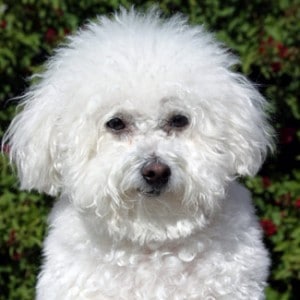From the desk of Sharda Baker.
Monday, March 17, 2014
Hi and welcome everyone!
This is Sharda with another Bichon Frise newsletter.
Here you will find the Bichon Frise Puppy Development stage that will serve as your guide as you see your new baby pup transform into an adult in front of your eyes!
Bichon Frise puppies typically stay with the mother and litter until at least eight weeks of age and the greatest amount of learning and socialization is done then, when your puppy arrives to you he or she has already established some understanding about the world around them.
Did you know that each Bichon Frise puppy is different and will mature and learn at slightly different rates?
So, today let’s talk more about the different stages of these Bichon Frise puppies’ growth and development.
The following are the basic stages and changes that occur from the eight-week mark.
Let’s start from 8 to 16 weeks…
EIGHT TO TWELVE WEEKS
In the period immediately after leaving the breeders, the Bichon Frise puppy is in the best possible developmental stage to form new bonds and understanding of the world it has entered into.
During this time you will see:
- A strong natural curiosity about the world around them. Puppies should be introduced in a safe and controlled manner to as many different animals, people and places as possible at this time to socialize the puppy.
- Bichon Frise puppies are not naturally fearful or timid but they may initially run or hide from new things, events, people or sounds. However, they should quickly come about to investigate. Once they learn they have nothing to fear, you will notice the fear response rapidly decrease.
- Puppies need to feel safe and secure at this time. They should have attention and support from the family but should also be allowed some independence to be a puppy. Often their white, fluffy and delicate appearance makes owners think they are not sturdy, hardy and curious puppies that need to have time to investigate the world and learn on their own.
- Bichon Frise puppies should be positively rewarded for a job well done but never punished or yelled at for making a mistake. Punishment at this time can damage the bonding process as well as make the puppies timid as they mature.
WEEKS 12 THROUGH 16
At this point, a well-socialized Bichon Frise puppy that has not been traumatized or frightened, and has bonded well with the family is ready to start serious training.
He or she is really also trying to determine the hierarchy of this human pack they are now living in. At this time, you will see:
- The puppy may try to engage the people in the family in games just like they would with other puppies. It is important to play with the puppy and spend time teaching them that they cannot bite or growl at people and that they can play with people with toys.
- Bichon Frise puppies at this age also need to learn their place in the family with regards to other dogs and pets. Since the Bichon Frise is not a dominant breed, they typically get along well with other pets although they may challenge other dogs or cats for who is actually “top dog”.
This is often done through simple growling and mild possessive type behaviours and rarely results in any overt aggressive behaviour on the part of the Bichon Frise. Other dogs may become more aggressive so supervision may be required.
- The Bichon Frise is also ready to start basic obedience training either through a training routine or a puppy class. Puppy obedience classes are highly recommended as they add socialization to the training process.
I’ll be stopping here for now. But don’t worry, we still have some ways to go as we explore these different Bichon Frise puppy stages.
I will continue our discussion about Bichon puppies after a couple of days. : )
I hope that you learned a lot from today’s Bichon Frise newsletter!
All the best and take care
Warmly,
Sharda Baker

